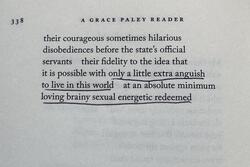Positioning Our Activism, Getting the Work Done
My friends and I often talk about how our religious and activist identities interconnect when, at times, they seem to be at odds. I've been thinking about this while reading some of the essays in a provocative new anthology entitled Righteous Indignation: A Jewish Call for Justice.
There's a lot in this collection, ranging from progressive Jewish views on poverty, genocide, education reform, healthcare, the environment, and reproductive rights (a piece by Judith Rosenbaum, JWA's Director of Education), to discussions about race, sexuality, and the Israeli/Palestinian conflict. Many of these essays use traditional Jewish texts to frame Jewish ethics and reorient contemporary discourse on religion and politics in the U.S. On the whole, Righteous Indignation presents the centrality of activism in progressive Jewish life, highlighting multiple ways in which Jewish leaders define their roles and responsibilities in addressing modern social problems.
One of the essays I've found myself reflecting upon most is a dialogue between Rabbi Rebecca Alpert and Danya Ruttenberg on Judaism, feminism, and activism. Both active in feminist movements and deeply engaged in the internal battles for women's rights in the Jewish world, Alpert and Ruttenberg hash out the complexities of feminist priorities and discuss where their activism can be effectively situated. With so much to do both within the Jewish community and out in the greater world -- coupled with limited resources, time, and energy -- Alpert and Ruttenberg raise some critical questions: How might the Jewish and secular feminist worlds connect more powerfully to maximize their impact? How can Jewish feminists reorient their priorities to feel "the connections between being Jewish and the state of the world?" Is there a need for an expressly Jewish voice within global feminist activism? Finally, how can feminists creatively focus their energies in a way that positions women's advocacy as central to addressing labor, childcare, education, housing, immigration, and other social justice causes?
Alpert and Ruttenberg don't arrive at a neat conclusion, but they do articulate essential challenges for Jewish feminist/activist communities, and open up possibilities for further conversations. I recently completed a six-part course on the History of the Jewish Left, and during the final class, we explored the difficulties and limitations of being Jewish in secular activist communities, and being activists in Jewish communities. Some of us were disenchanted by the bifurcation of religious life and activist orientations and wanted to strive for deeper integration. Others shared that many of their fellow activist friends and partners are, in fact, Jewish but check their Jewish identities at the door or are content with having their Jewishness be invisible. Some asked: "Does identifying yourself as Jewish matter at all when working toward universal justice? Isn't it the work itself and not the identities of the activists that matters most?" Multiple opinions surfaced ranging from: "I'd hesitate to say I'm Jewish because I don't want to be associated with the Jewish establishment and risk losing my credibility" to "I'd absolutely say I'm Jewish because I want to challenge dominant perceptions of who Jews are and what they care about." A third opinion was: "My Jewish identity wholly motivates my activism, so I'd prefer to be involved in activist communities comprised of strongly identified Jews. I don't want to apologize for being Jewish." There are certainly valid points expressed in all of these statements, not to mention the implicit underlying problems of anti-Semitism on the Left that often go unaddressed by Jews and non-Jews alike.
For me, publicly identifying myself as Jewish is, in fact, central to my own activism and something that I've always felt uncomfortable not articulating. And at the same time, I struggle with feeling embarrassed about spending a considerable amount of time hanging out with progressive Jews doing "progressive Jewish things" rather than having more contact with diverse populations outside of my own community. Ideally, I'd like to find myself involved in building activist coalitions that reach across religious, racial, and socio-economic lines that don't seek to dilute the particularities of each group.
How does Judaism inform your own activist identities? Do you situate your activism (feminist or otherwise) inside the Jewish community or out in the greater world? How do you strive for a balance?







I was trying to hash out my feelings several years ago about being involved with mainstream as a progressive Jew, and the expectations and dissonances that derived from that, when a friend said, "I don't have that problem. I'm a radical. That means not having to follow any party line."
I think that defines part of the essence of being involved trying to effect social change as a Jew. Our tradition is prophetic--our radicals had no trouble being themselves, offering hope to the disenheartened, but also castigating those in power or untrue to their tradition.
It doesn't matter whether we end up working primarily with Jews or not (and I really understand the temptation not to deal with ideological blinders and anti-Israel or anti-fundamentalist stupidity by choosing to work solely with other Jewish activists--except that it only changes the nature of the inherent mainstream "progressive" conservativism--it doesn't obviate the problem).
In the end, the task is still, as the Talmud says, larger than ourselves or our lifetimes. The critical issue is to be involved in transforming our world, in making it better, in some form of tikun olam. What manifestation of that activism best fits us is far less relevant than our active engagement with the world.
I'm really looking forward to reading this book.